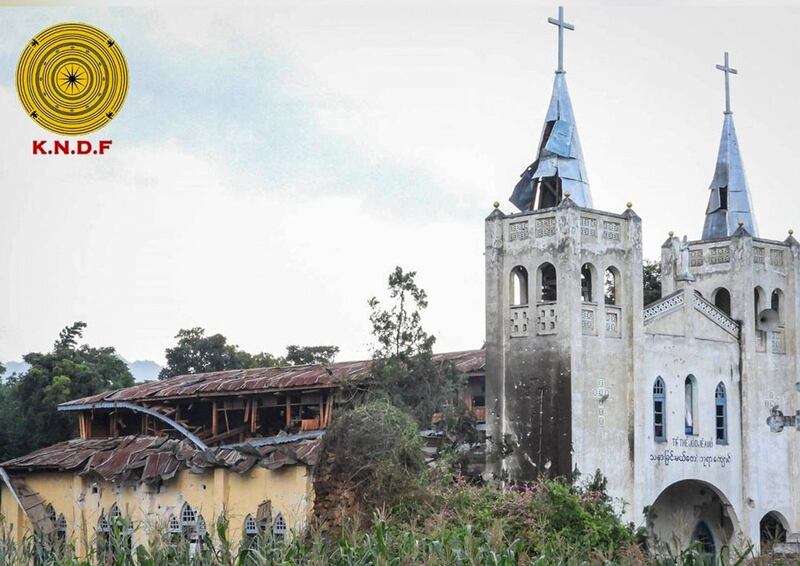Myanmar’s shadow government, armed resistance and activists have welcomed the U.S. Treasury Department’s expansion of sanctions targeting those who procure jet fuel the military regime uses in air strikes against civilians at a rate of nearly once every two days.
More than 3,900 civilians have been killed by the regime since it seized power in February 2021, the Treasury Department said in announcing the move Wednesday, with the junta increasingly reliant on “violent air strikes” against civilians, including “women and schoolchildren,” to maintain its hold on power.
Myanmar’s shadow National Unity Government, or NUG, Presidential Office Spokesman Kyaw Zaw welcomed the sanctions, saying they will help prevent the loss of lives to junta airstrikes.
"These jets are used by the military to kill innocent civilians and destroy hospitals, clinics, religious buildings and houses,” he told RFA Burmese. “Many lives have been lost due to the junta’s air strikes. We welcome the U.S. sanctions aimed at preventing such losses."
Accompanying Wednesday’s announcement was the designation of two Burmese individuals – Khin Phyu Win and Zaw Min Tun – and a company – Shoon Energy Pte. Ltd – that the Treasury Department said were involved in procuring jet fuel for use by Myanmar’s military.
The sanctions mean that American citizens and firms, including banks, cannot have any business relationship with those targeted.
The announcement singled out two recent air strikes on civilians in the Sagaing region – one in April and one in June – as the impetus for the expansion of the sanctions, saying the sanctions will "further deprive the regime of the resources that enable it to oppress its citizens."
Sagaing has been a hotbed of clashes between the military and anti-junta People’s Defense Force, or PDF, paramilitaries since the February 2021 coup. Almost 800,000 residents of the region have been forced to flee due to the conflict since the junta seized power, the United Nations says.
Frequent airstrikes
According to a report released in May by the Nyan Lynn Thit Analytica, the junta has conducted at least 1,427 air strikes, at a rate of nearly once every two days, since the military seized power.
Kayin state, home to the Karen National Union ethnic army, saw the highest number of strikes in the 27 months of junta rule ending in May, followed by Sagaing.
A member of the PDF in Kayin, who declined to be named for security reasons, said that the U.S. sanctions will bolster the resistance and protect civilians.
“Our revolutionary forces gladly welcome and support such sanctions,” he said. “The junta’s attacks using airplanes have affected not only our revolutionary forces, but also innocent civilians. Many people are injured and killed by such attacks."

Since March 1, rights groups including Amnesty International, Global Witness and Burma Campaign (UK) have issued reports urging the international community to sanction large energy companies that sell jet fuel to the junta, as well as the transportation and insurance companies that help the regime procure it.
Burma Campaign (UK) Director Mark Farmaner praised Washington’s response this week, calling it “one of the best things the U.S. government can do to prevent the human rights abuses and humanitarian crisis in Myanmar.”
‘Sanctions will not change our country’
But Thein Tun Oo, the executive director of the Thayninga Institute for Strategic Studies, a group of former military officers, suggested that the sanctions will have little impact on Myanmar as a whole, but an outsized negative effect on its people.
"Western countries always assume that such sanctions could change the course of a country, but when you look back at the history of the world, it has only been successful with almost entirely isolated and helpless countries,” he said. “What is certain is that sanctions will not change our country in the direction they want it to go, although it will affect the grass-root level.”
Attempts by RFA to contact junta Deputy Information Minister Major Gen. Zaw Min Tun for comment on the sanctions went unanswered Thursday.
Ko Mike, a spokesman for the Blood Money Campaign, a collective of Myanmar activists campaigning to stop revenues reaching the junta, argued that the jet fuel sanctions will have a meaningful impact if implemented correctly.
"The military [in prior regimes] has experienced such sanctions and found ways to maneuver its path to continue its course,” he noted. “If the U.S. government cooperates properly with the governments of [Association of Southeast Asian Nation] countries like Singapore, I believe they will be able to put a more effective jet fuel embargo into place against the junta."
The U.S. has been gradually ramping up economic sanctions against the junta since the coup.
In June, Washington sanctioned two of Myanmar’s state-owned banks – Myanmar Foreign Trade Bank and Myanmar Investment and Commercial Bank – in a bid to cut off funds to the regime, citing its purchase of arms from foreign sellers.
Junta Central Bank Chairwoman Than Than Swe told businessmen over the weekend that the sanctions and their impact have made the regime "furious," while junta chief Senior Gen. Min Aung Hlaing accused "some countries" of using the U.S. dollar "as a weapon" in a video address to the 11th Moscow Conference on International Security on Aug. 15.
Other banks have also taken steps. Since the sanctions were put in place, United Overseas Bank, one of Singapore’s largest banks, announced earlier this month that it would suspend all bank-to-bank operations with Myanmar starting Sept. 1.
Sonali Bank, owned by the Bangladesh government, also announced last week that it had frozen accounts for the two banks with a total value of more than US$1.1 million.
Translated by Myo Min Aung. Edited by Joshua Lipes and Malcolm Foster.
